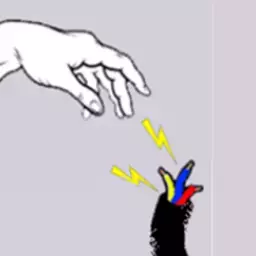kronisk
- 0 Posts
- 16 Comments
Or find a thread where someone else asked the same question, and give the wrong answer/solution.
So you simply already need to know what you’re asking it, gotcha. Seems easy enough.
I had a coworker in the early 00s that would repeatedly fail to search for something because she would type “www.goggles.com” into the address bar.

 1·3 months ago
1·3 months agoI also don’t think that not having morals would necessarily prevent me from caring if people are hypocritical, or thinking that other people are morally repugnant. I’m just thinking that they’re morally repugnant by some external set of morals which aren’t my own, obviously, some morals which I haven’t internalized, and which aren’t mine, probably.
Think you have it in you to write at least one paragraph where you don’t contradict yourself? You say you care, but have no internalized morals? Which is it?
Yes, having no morals would prevent you from caring if people are hypocritical – this is what is known as a moral stance. Without morals, there is nothing wrong with hypocrisy.
Sorry to keep you from your preferred activities, I just think you should really think this through before you mention it to anyone again.

 1·3 months ago
1·3 months agoThen why care if people are being hypocritical? Why should it bother you that people adopt whatever beliefs are beneficial at the moment and then change them when it suits them? Isn’t that the smartest attitude to have? How could you even call someone else “morally repugnant”?

 3·3 months ago
3·3 months agoNot nonsensical, contradictory. You obviously have some morals.

 91·3 months ago
91·3 months agoI don’t have morals
I still think it’s pretty morally repugnant
I dunno I wonder how much of this thread believes in rehabilitative justice when it’s convenient for them to do so, but will then turn around and advocate for extreme eye for an eye style punitive, retributive justice whenever it strikes their moral fancy.
Well.

 111·3 months ago
111·3 months agoThis has nothing to do with Linux. Do you want your printer to work? Are you buying a printer because you need to print things? It’s simple.
Yes, the background pattern and colours should be chosen to actively interfere with reading any text on the page. For example, it’s great if there’s large patches of black in the background and the text is also black.
Flashing is also key. A lot of text should be flashing and there should be unreadable ticker tape text at random places.
deleted by creator

 16·4 months ago
16·4 months agoOK, I’m imagining it now.

 34·6 months ago
34·6 months agoThis is such an absurd take. There’s people in Europe who believe that Europe’s megalithic structures were built during the time of Atlantis and devote their whole existence to proving it, just to give one example. And of course, Stonehenge, neolithic Europes intergalactic landing site/astronomical calendar/astral energy power plant.
Megalithic structures like the Baalbek stones or Göbekli Tepe from preliterate times are aweinspiring enough to get anyone’s imagination going, it’s that simple. And some people then have a hard time distinguishing their imaginings from reality. They seem impossibly large and their purpose and methods of construction are lost to time, so it’s easy to come up with fanciful ideas to fill in the blanks. Sure, we now have decent theories of how the pyramids were built, but that weren’t always the case.
Castles and cathedrals were built too recently for even the wildest of wild brains to believe they weren’t built by humans.
Well, if you experience consciousness, that’s what consciousness is. As in, the word and concept “consciousness” means being conscious, the way you experience being conscious right now (unless of course you’re unconscious as I write this…). Free will does not enter into it at the basic level, nothing says you’re not conscious if you do not have free will. So what would it really mean to say consciousness is an illusion? Who and what is having the illusion? Ironically, your statement assumes the existence of a higher form of consciousness that is not illusory (which may very well exist but how would we ever know?). Simply because a fake something presupposes a real something that the fake thing is not.
So let’s say we could be certain that consciousness purely is the product of material processes in the brain. You still experience consciousness, that does not make it illusory. Perhaps this seems like I’m arguing semantics, but the important takeaway is rather that these kinds of arguments invariably fall apart under scrutiny. Consciousness is actually the only thing we can be absolutely certain exists; in this, Descartes was right.
So, it’s meaningful to say that a language model could “fake” consciousness - trick us into believing it is an “experiencing entity” (or whatever your definition would be) by giving convincing answers in a conversation - but not really meaningful to say that actual conscious beings somehow fake consciousness. Or, that “their brains” (somehow suddenly acting apart from the entity) trick them.
Anyone wanna make a firefox plugin or something for this?

 15·9 months ago
15·9 months agoEurope gives Elon Musk 24 hours to respond
So kinda like… a Final Countdown?




Apps are challenging to preserve, but it’s the MMORPGs and online games that are almost impossible since there is no game without active servers and people playing the game. Hardware can be emulated and code preserved, so the apps you’re talking about could be preserved IF Apple, Google et al wanted to - which of course probably won’t happen, but still.